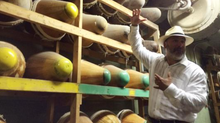Middle School Videographers Showcase Manufacturing
Are middle-school videographers the fix for manufacturers' talent shortage?

The irony wasn't lost on Thomas "Tim" Rushton as he joined a crowd of 800 packed into SteelStacks, the entertainment venue raised on the bones of the old Bethlehem Steel plant in Bethlehem, which decades ago employed thousands in the industrial heart of the Lehigh Valley.
Rushton and a crowd of students, parents, manufacturers, educators, and local officials were at a spring event to cheer middle-school videographers.
The kids had filmed competing mini-documentaries, all titled What's So Cool About Manufacturing.
"It was amazing to see the energy. It was almost like opening night on Broadway," said Rushton, director of the Lehigh Career and Technical Institute, a public vo-tech high school in the Lehigh Valley.
Those videos, as it turned out, were magical.
Until a few years ago, Rushton, like directors of vo-tech high schools around the nation, watched as enrollment in his school slipped, particularly in manufacturing disciplines such as welding, machine-tooling, and drafting.
Meanwhile area manufacturers, poised for growth after the recession, looked at their aging workforces and wondered where they would find the talent to keep operating in the future.
Maybe, for the Lehigh Valley, the answer could be found at the SteelStacks. And if it worked there, maybe it would also work in Philadelphia, Bucks, and Montgomery Counties.
"Many of our skilled workers are in their 60s," said Steve Jurash, chief executive of the Manufacturing Alliance of Philadelphia. "There's no one coming up behind them. Companies are scared."
Five years ago, Jack Pfunder, a serial entrepreneur, a retired manufacturing engineer, and now president of the Manufacturers Resource Center in the Lehigh Valley, was stewing over the problem.
"How do we get on their radar?" he wondered. How did you get young people interested in careers in manufacturing?
Then Pfunder had an epiphany as he watched his 5-year-old grandson using an iPhone to make a video of his mom.
Point one: Kids love video.
Point two: Manufacturers need workers. (Jurash cites U.S. Labor Department statistics saying there will be 3.5 million manufacturing jobs by 2014 and, of those, 2 million will go unfilled due to a lack of properly skilled workers.)
Point three: The pipeline begins in middle school when students are choosing high schools.
Point four: They didn't appear to be choosing vo-tech schools because they and their parents had little idea about the possibility of manufacturing careers, and if they did, they thought they were dirty, dangerous, and not as prestigious as white-collar jobs in offices.
With those points in mind, Pfunder thought it would be good to pair teams of middle schoolers with local manufacturers and have the kids create short videos at local plants.
They'd see the factories, they'd get excited, and they'd get their parents excited.
Pfunder upgraded his vision in partnership with Lehigh Valley's public television station, which stressed the importance of teaching the kids to produce quality videos, training teachers in the process.
A later wrinkle was online voting: A contest would draw more kids and their parents to watch videos.
Each year, the number of teams grew. In the Lehigh Valley, companies such as Mack Trucks, Air Products and Chemicals Inc., and C.F. Martin & Co. guitars participate.
In Philadelphia, Paul Gannon, a vice president at Stockwell Elastomerics Inc., a custom gasket manufacturer, is looking forward to seeing a team of Philadelphia middle-school videographers at his plant in the Northeast.
"Many kids look down on manufacturing," he said.
Gannon has been trying for months to fill a position, for example, for a second-shift machine set-up operator.
"It's hard to find welders and machine operators," he said.
Last Thursday, area teachers began training in the program. Among them was Joseph Podrazik, a technology teacher at East Norriton Middle School in Montgomery County.
Podrazik left teaching to work in manufacturing, but returned eight years ago when his job was moved to India. He said he's excited about the program.
"Kids have no idea what an assembly line is," he said. "The assembly lines of today are different with robotics."
The robots do the work, but "you have to find somebody who knows how to program the robot and do the maintenance of the robot," he said.
Rushton said "many, many manufacturers are vying" for his high school's manufacturing graduates.
"There are more positions available than students," he said. "As many as we put out, the demand is greater than the supply."
Maybe it's coincidence that enrollment in his school's manufacturing disciplines has risen to 372 students this year, from 254 students in 2012-13.
But Rushton doesn't think so, not after more than 110,000 people viewed last year's videos and voted for the best online.
"When you watch this whole event, it's in the shadow of the Bethlehem Steel stacks, and it is interesting to reflect that this was manufacturing decades ago, and here you are sitting celebrating what manufacturing is today," he said.
Decades ago, he said, Bethlehem Steel was a big, bustling dirty plant. "Now you go high-tech. There's filtered air and people are in special suits and everything is behind glass. It's like night and day."
Original article located at: http://www.philly.com/philly/business/labor_and_unions/20161024_Are_middle-school_videographers_the_fix_for_manufacturers__talent_shortage_.html





















